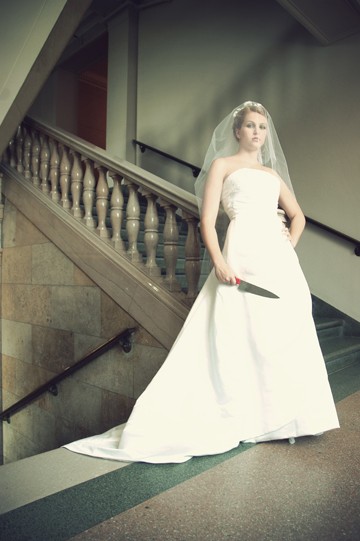âÄúBig LoveâÄù WHEN: Oct. 16-24 WHERE: Whiting Proscenium Theatre, Rarig Center TICKETS: $5-17 There is a rule commonly used in Greek drama to determine whether a play is a comedy or a tragedy: If the play ends with everyone dead, it was a tragedy. If not, chances are it was a comedy. Now, without trying to give too much away, itâÄôs fairly safe to say that âÄúBig Love,âÄù The University TheatreâÄôs modern adaptation of the ancient Greek âÄúThe Suppliant Woman,âÄù would not be classified as a comedy. The premise of the play is a vertex between 1600âÄôs âÄúMuch Ado About NothingâÄù and the 1999 classic âÄúThe Runaway Bride,âÄù featuring Julia Roberts. 50 Greek women wash up on the Italian shore, fleeing their Greek-American cousins with whom the women are contractually obligated to wed. They are taken in by a welcoming Italian family, but when their cousins arrive dramatically by helicopter in pursuit of their expected brides-to-be, the two parties begin to clash. After a back and forth struggle, the women are finally forced into marriage. They devise a plan, however, to get revenge, which in the process firmly renders the play a tragedy (hint hint). âÄúBig Love,âÄù sponsored in part by the Office for Equity and Diversity and the WomenâÄôs Center, deals with many themes surrounding the modern arrangement of love. One of the most prominent of these themes is the separation of roles and the different expectations that bind each gender. One arising theme is anger âÄì a lack of anger regarding gender inequality can deplete a personâÄôs will to act just as harboring too much anger can lead to inner and outer destruction. For each sex, there are three different characters representing three various levels of gender role angst: too hot, too cold and just right. For example, the characters Thyona and Constantine, both the âÄútoo hotâÄù representatives of their respective team, clash when her militant feminism rubs his traditional masculinity in the wrong direction. Throughout the play, each side derides the other sex for their lack of understanding when in actuality the plight of the genders can almost be viewed in parallel. The acting in âÄúBig LoveâÄù is intensely physical. The play contains many extended sequences of performers literally throwing their bodies to the ground and also includes several âÄúfull nudityâÄù scenes, as the warning near the bottom of the promotional poster cheekily states. These physical sequences often come in random spurts of extreme energy accompanied by a suddenly screaming soundtrack. The technique illustrates the inner battles present in the characters and gives the play a sense of uneasiness. Despite what should be a clear ruling using the death index of Greek theater, âÄúBig LoveâÄù has been generally labeled a comedy. There are indeed some sporadic funny bits mixed in with the beginning, but they quickly become fewer and farther between as the severity of the matter at hand descends.

Honey, is it just me or do you seem a little too anxious to cut the cake? PHOTO COURTESY UNIVERSITY OF MINNESOTA THEATRE
50 ways to leave your lover
The U Theatre’s new production of “Big Love” sheds light on the intricacies of love, marriage and gender roles in the modern world.
Published October 8, 2009
0
More to Discover







